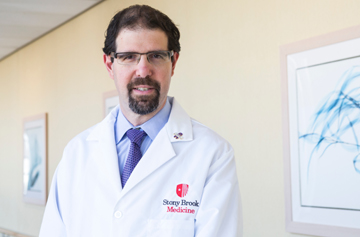LONG ISLAND'S FIRST PANCREATIC CANCER CENTER NOW HERE AT STONY BROOK MEDICINE
Designation by National Pancreas Foundation Is Respected Seal of Approval
STONY BROOK, NY, August 28, 2018 — Stony Brook Cancer Center has just been designated by the National Pancreas Foundation (NPF) as a Pancreatic Cancer Center. It is the first NPF Cancer Center on Long Island, and one of only six in New York State.
Aaron R. Sasson, MD, professor of surgery and chief of our Surgical Oncology Division, directed the initiative and preparation for the screening process to gain the special NPF designation.
About the Pancreatic Cancer Center, Dr. Sasson is quoted in an article published by TBR News Media: "As opposed to one person leading this, there are many people here who are required to have an interest in pancreatic cancer."
"We are not only looking to build a great infrastructure for the treatment of pancreatic cancer, but we’re also looking to build a team for research on pancreatic cancer."
Dr. Sasson points out that the Stony Brook Cancer Center already has a number of scientists pursuing research on pancreatic cancer, plus a record of using leading-edge treatments for it.
In addition to our surgical oncologists who specialize in the management of this disease, the Cancer Center's multidisciplinary Gastrointestinal Oncology Team includes a range of specialists in medical hematology/oncology, radiation oncology, gastroenterology, pathology, and radiology.
Other specialists at the Cancer Center who provide care for patients with pancreatic cancer include nutritionists and social workers.
NPF designation means we provide multidisciplinary care for the “whole patient” with a focus on the best possible outcomes and an improved quality of life.
Pancreatic cancer is a deadly disease. It is estimated that more than 55,000 people will be diagnosed with this cancer in the United States this year, according to the American Cancer Society, and that about 44,000 people will die of it.
Pancreatic cancer tends to go undetected until it is advanced. It grows fast in most cases. By the time symptoms of the cancer occur, diagnosing it is usually relatively straightforward.
Patients with this cancer have only an 8% survival rate five years after diagnosis. Survival rates are low because fewer than 10% of patients' tumors are confined to the pancreas at the time of the diagnosis.
In most cases, the malignancy has already progressed to the point where surgical removal is impossible.
A widely respected specialist in pancreatic cancer, Dr. Sasson is interested in screening and early detection as well as biomarkers. At least half of his work is related to pancreatic cancer. He has been selected for inclusion in the Castle Connolly Guide, America's Top Doctors for Cancer, as well as the Best Doctors in America database.
Approved NPF Cancer Centers have to go through an extensive auditing process and meet the criteria developed by a task force made up of invited subject matter experts and patient advocates.
NPF designation also means we are committed to advancing the treatment of pancreatic cancer through basic and clinical research to save more lives.
The criteria include having the required expert physician specialties such as pancreas surgeons, gastroenterologists, and interventional radiologists, along with more patient-focused programs such as a pain management service, psychosocial support, and more.
For patients and families coping with pancreatic cancer, there are inconsistencies in the level of care they receive at various hospitals. The NPF Cancer Centers designation helps to facilitate the development of high-quality, multidisciplinary care approaches for the field.
NPF-designated centers also seek to advance research and lead the way for heightened awareness and understanding of pancreatic cancer among community physicians, allied health professionals, patients, families, and the general public.
A nonprofit organization founded in 1997, the NPF provides hope for those suffering from pancreatitis and pancreatic cancer through funding cutting-edge research, advocating for new and better therapies, and providing support and education for patients, caregivers, and healthcare professionals.
The NPF goes through an extensive screening process to designate Pancreatic Cancer Centers, recognizing those that focus on multidisciplinary treatment of pancreatic cancer.
The NPF offers this distinction only to those institutions that treat the "whole patient" and that offer some of the best outcomes and improved quality of life for patients with pancreatic cancer.
| "[Dr. Aaron R. Sasson] had a patient who was about 80 at the time of his diagnosis. His primary doctor told him to get his affairs in order. 'We operated on him and he lived another six or seven years,' Sasson recalls. 'He was grateful to see his grandchildren graduate and to see his great-grandbabies being born.' While every patient is unlikely to have the same outcome, Sasson said surrendering to the disease and preparing for the inevitable may not be the only option, as there may be other courses of action." — TBR News Media (read more) |

